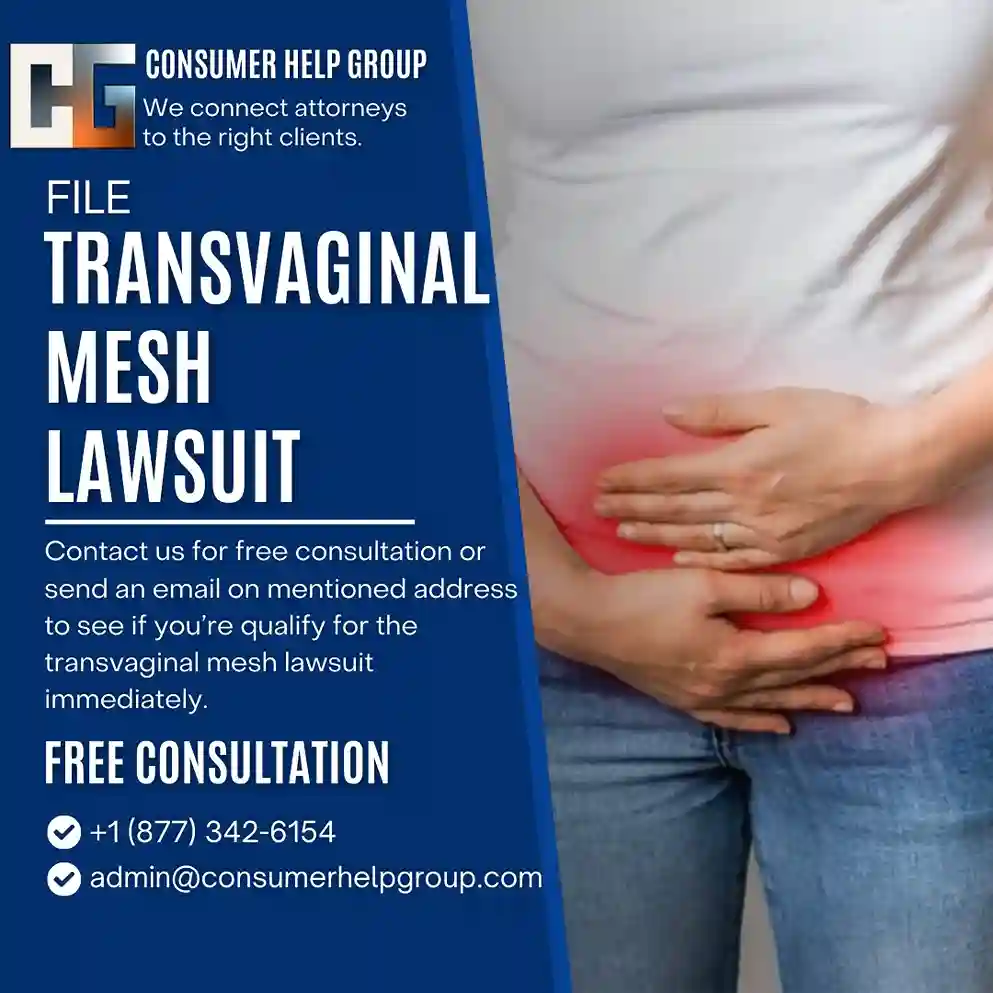
Address
1515 N University Dr. # 220 Coral Springs, Fl 33071
Phone
+1 (877) 342-6154

1515 N University Dr. # 220 Coral Springs, Fl 33071
+1 (877) 342-6154
If you’ve experienced painful side effects or complications from a transvaginal mesh implant, you deserve compensation.
During the past decade, juries have returned numerous verdicts against transvaginal mesh manufacturers. After fighting their cases in court, plaintiffs have received millions of dollars in compensation for medical bills, injuries, and emotional damage. Transvaginal mesh makers have settled thousands of legal claims for roughly $8 billion.
The first transvaginal mesh lawsuits went to trial in 2012 and 2013. Since then, multiple transvaginal mesh producers have lost multimillion-dollar lawsuits. Many companies have agreed to large legal settlements to avoid facing plaintiffs in courtrooms, but others have delayed proceedings and settlements.
Transvaginal mesh (TVM) devices, commonly used for pelvic organ prolapse (POP) repair, have been linked to various complications. Research indicates a significant variance in complication rates, but a comprehensive review by D. Barski and D.Y. Deng in BioMed Research International found that these rates generally fall between 15% and 25%.

Transvaginal mesh is used as a surgical solution for pelvic organ prolapse (POP), a condition where the pelvic organs push against the vaginal walls due to weakened pelvic muscles. The mesh acts as a reinforcing structure, providing support to these muscles. This helps keep the pelvic organs, such as the bladder, uterus, and rectum, in their correct positions.
Benefits and Risks
While transvaginal mesh offers the benefit of enhanced support and potentially reduced recurrence of prolapse, it comes with certain risks. These can include:
Pelvic organ prolapse can be managed with several noninvasive treatments designed to strengthen the pelvic floor and alleviate symptoms like urinary incontinence. Here are a few options:
Engaging in specific physical therapy exercises can help improve the strength and function of the pelvic floor muscles. Techniques such as Kegel exercises, biofeedback, and pelvic floor physical therapy sessions are commonly recommended.
Pessaries are silicone devices inserted into the vagina to support the pelvic organs. These devices come in various shapes and sizes to accommodate different needs and can be managed by the patient, reducing the dependence on frequent medical visits.
Both options aim to offer significant relief without the need for surgical intervention, making them practical choices for many women managing pelvic organ prolapse.
If you’ve had a transvaginal mesh (TVM) implant, it’s crucial to take proactive steps to ensure your health and well-being.
Be aware of and watch out for any new or unusual symptoms. Some signs that may indicate complications include:
If you notice any of the symptoms mentioned above, consult your doctor as soon as possible. Early intervention can often prevent more severe health issues.
Experiencing complications from a TVM implant may warrant legal action. You might want to consult with an experienced medical device attorney to discuss your options for pursuing a negligence claim. Legal advice can offer insight into whether you have a viable case and guide you through the process if you choose to proceed.
By following these steps, you can better manage your health and respond promptly to any issues that may arise from your TVM implant.
Transvaginal mesh (TVM) devices have been the subject of significant legal scrutiny and numerous lawsuits. Several major companies have been involved in the production of these medical devices. Here are some of the primary manufacturers:
During the past decade, juries have returned numerous verdicts against transvaginal mesh manufacturers. Plaintiffs have received millions of dollars in compensation for medical bills, injuries, and emotional damage after fighting their cases in court. More than 100,000 lawsuits have been filed against the makers of transvaginal mesh (TVM) products. Transvaginal mesh makers have settled thousands of legal claims for roughly $8 billion.
As of August 2024, vaginal mesh settlements have generally ranged between $40,000 and $450,000. Plaintiffs who have pursued their cases to trial have, in some instances, secured multi-million-dollar jury verdicts, though several of these awards have been reduced or overturned on appeal.
The compensation each plaintiff may receive in a transvaginal mesh settlement is influenced by various factors, including the severity of their physical injuries, the plaintiff’s age, and the extent of medical treatment required. Engaging an experienced transvaginal mesh attorney is essential to effectively navigating the legal process and maximizing potential settlement outcomes.
If you have experienced injuries resulting from a transvaginal mesh implant and have sought medical treatment, you may be eligible for a transvaginal mesh settlement. Attorneys currently accepting cases typically focus on clients who have recently undergone mesh removal or required revision surgeries. A specialized transvaginal mesh attorney can provide a definitive assessment of your eligibility.
To determine if you qualify, your attorney will inquire about various aspects of your transvaginal mesh experience. These inquiries typically include the date of your implant, the onset of complications, and the nature of the treatments you have received to address these issues.
It is crucial to be aware of the statute of limitations, which imposes a time limit on filing a lawsuit for a potential transvaginal mesh settlement. If this period has expired, you may be barred from pursuing a claim. However, it is advisable to consult with an attorney regardless, as there may still be legal avenues available to you.
